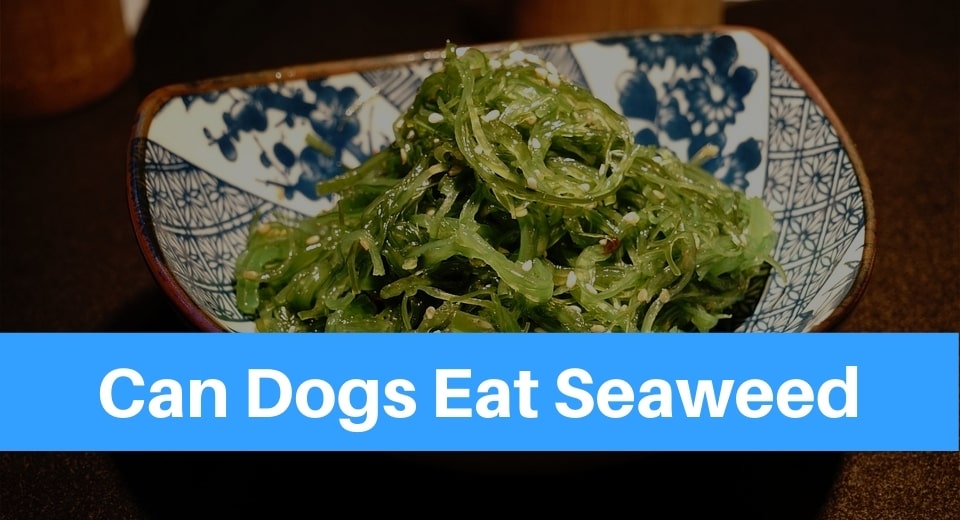Although dog owners enjoy sharing food with their dogs, they should know that dogs digestive systems are different from ours. What is good for us doesn’t mean that it is also good for our dogs. Feeding them dates might be fine, but that’s not the case for everything else.
Because of that, you should be cautious when you are introducing any new food into your dog’s diet. Some human foods may be toxic to dogs and cause many health problems. Some of these foods can even lead to death of your dog.
As a dog owner you have to provide your dog a balanced and nutritional diet that will keep him healthy and active. Although a dog’s diet is based primarily on meat products, dogs also need vegetation in their diet.
In this article we will deal with seaweed and its impact on your dog’s health. Can your dog eat seaweed or it is not recommended? Is seaweed toxic for dogs? Have you ever given seaweed to your dog? Read this article thoroughly and you will find out soon, but first we will tell you some things about seaweed that you maybe didn’t know before. So, let’s start.
More about Seaweed
Seaweed is a large algae that is growing in the sea or on the rock below the high-water mark. It refers actually to several species of macroscopic marine algae. The term seaweed includes some types of red, green and brown algae. Seaweed is a great source of iron, magnesium, iodine and omega 3 fatty acids. Seaweed has a lot of health benefits for people and it is used as a popular supplement.
But, can we feed our dogs seaweed? Is it safe for our dogs or it may be poisonous? Just continue reading and you will find out below.
Is Seaweed Safe for Dogs?
You may be worried if your dog loves seaweed. But, we have good news for you. Seaweed is safe for your dog and you can use it as a special treat once or two times a week. If used in moderation seaweed can be beneficial for dogs. Some types of seaweed contain restorative properties which give your dog a glossy coat.
Seaweed is also rich in vitamin B12, which improves a cognitive function of your dog. Due to its high content of fatty acids, seaweed also promotes a joint health, which is crucial during the growth stage of your dog. The type of seaweed that is absolutely edible and safe for your dog is Nori seaweed. It is a Japanese staple that is usually associated with sushi. Nori seaweed is available at some supermarkets, but also in most Asian food restaurants. Nori seaweed has beneficial effects on your dog’s health. It doesn’t have strong flavor or smell and you can add it to your dog’s regular food.
It is also important how you use seaweed. Dried and wild seaweed that you can find on beaches during the summer is not good for your dog. Actually, the sun may dry out the seaweed, which may be dangerous for your dog. When digested, seaweed can expand inside the stomach of your dog and cause fatal blockages. Many studies have shown that dogs who ingested dried up seaweed died, so it is best to avoid dried seaweed completely.
A small amount of seaweed probably won’t do any harm to your dog, so we recommend you to sprinkle a little of it on your dog’s meal. Some types of seaweed contain high amounts of mercury, due to the seawater pollution. So, if you overfeed your dog seaweed, it could be dangerous.
To avoid any health risks, it is best to feed your dog seaweed only as a supplement or as a treat. You should never use seaweed as an integral part of your dog’s diet. Large amounts of seaweed may also cause diarrhea, bloating and other problems in the gastrointestinal tract of your dog.
Summary
After reading this article, you have to decide your own if you will feed your dog seaweed or you will find some other treat. We have told you that seaweed may be safe for dogs if eaten in small amounts. Large amounts of seaweed may cause many side effects to your puppy, so you should use it in moderation.
As we have already said, it is important to introduce new foods gradually into your dog’s diet. Remember that a dog’s digestive system is too sensitive so it is not able to tolerate certain human foods.
Also, you should always keep in mind that you are responsible for your dog’s health, so you have to provide your dog long and happy life. If you have any questions, you should consult your veterinarian and he will certainly help you with a diet and other things that you should provide your dog in order to keep him healthy. You can also read more of our articles, including one that discusses whether dogs can eat sunflower seeds.

